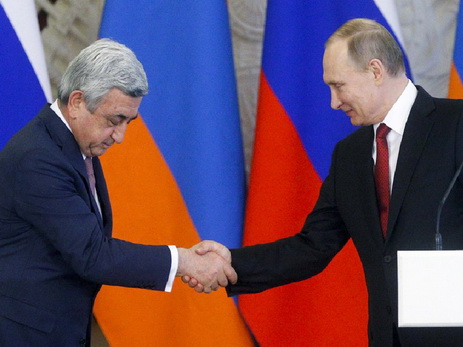With Russia strengthening its alliance with Armenia, it's time to cut off foreign aid to Armenia

Just weeks ago, Armenian President Serzh Sargsyan announced that his nation and Russia will discuss the creation of a joint military-industrial complex in the city of Gyumri, Armenia. This should raise alarms on the Capitol Hill and throughout Washington, as this is just the next step in a Russian military buildup utilizing its vassal Armenia as a proxy and launching point for operations against NATO.
While the group of congressmen who form the Congressional Armenian Issues Caucus continue their unflinching, if not brazen, financial and military support to this South Caucasus nation, it serves as a military outpost for saber-rattling Russia — Armenia even brands itself as one of Russia's important military outposts.
In an interview with Izvestia, a Russian daily, Sargsyan declared that Armenia is consistently building up its defense capability in the framework of military-technical cooperation with Russia. Also, he stressed the role of the 102nd Russian military base located in Armenian territory. And in November 2016, Armenia joined the anti-aircraft defense system of the Russian Federation.
The deepening Armenian military alliance with Russia poses a direct threat to NATO. According to Adam Ereli, former deputy spokesman at the State Department, speaking to Veterans Today, the agreement's reinforcement of the Russian troops in this region can threaten countries of NATO and their Western allies.
Ereli noted specifically, "Over the last six months – as Russia's war in Syria and pressure on Turkey has intensified – the flow of its arms and personnel into Armenia has escalated to include advanced Navodchik-2 and Takhion UAV drone aircrafts, Mi-24 helicopter gunships and Iskander-M ballistic missiles."
The deployment of Iskander-M missiles significantly changes the military balance in the region. Iskander-M carries a warhead of 710–800 kg and has a range of 500 km. In February 2017, the Russians moved Iskander ballistic missile systems within strike range of anywhere in Turkey, Israel or Azerbaijan, some of the United States' closest allies.
These developments are in sharp dissonance with the continued financial support for Armenia approved by Congress and President Barack Obama's administration. The main lobbying effort on behalf of Armenia is conducted by the Armenian Caucus. This caucus is currently co-chaired by Rep. Frank Pallone, D-N.J., Rep. Jackie Speier, D-Calif., Rep. David Trott, R-Mich., and Rep. David Valadao, R-Calif.
The official mission of the caucus runs counter to U.S. interests, as it advocates for increased trade and assistance to Armenia, self-determination for Nagorno Karabakh, and supporting U.S. recognition of the Armenian Genocide. The Armenian Caucus requested $40 million in aid for 2016. The Obama administration proposed $18.4 million in Economic Support Funds for Armenia in 2016.
The Obama administration also approved a continued "parity policy" with Azerbaijan, an American partner in the strategically-important Caspian region, in terms of appropriated military aid, with International Military Education and Training (IMET) assistance set at $600,000 and Foreign Military Finance (FMF) at $1.7 million. USAID has annually allocated $2,000,000 for the breakaway Nagorno-Karabakh, the sovereign territory of Azerbaijan under the military occupation by the Armenian forces.
Adam Ereli pointed to a very weak, even non-existent, response by the West to the beefing up of the Russian-Armenian military alliance. Western experts concur that Russia is preparing a new military alliance with Armenia, which may serve a launching point to unexpectedly hit at the interests of the U.S. and NATO in the region.
In light of the strengthening military alliance of Armenia with Russia, the wisdom of continued support for Armenia needs to be not questioned, but openly condemned. Armenian "political" organizations such as the Armenian National Committee of America and others are, in fact, Russian puppets.
They are completely dedicated to perpetuating within Congress the old and corrupt idea that relations with Russia are good for Armenia and that is, in turn, good for the U.S. This, while existing pro-Russia organizations do all in their power to sideline new Armenian organizations that are decidedly anti-Russian.
This unwarranted support by the Armenian national organizations in the U.S. for the anti-Western policies carried out by the Kremlin and Yerevan should be exposed. The new stage in Armenian-Russian strategic cooperation represents a military threat to the Western alliance.
Members of the Armenian Caucus should be reprimanded and financial aid to Armenia must cease, especially when the post-war American allies in NATO are asked to increase their contributions in order to beef up Western defense against Russia.
Alexander Murinson is a senior fellow at the Begin-Sadat Center and Bar Ilan University. He holds a Ph.D. from the School of Oriental and African Studies, University of London and is the author of "Turkey's Entente with Israel and Azerbaijan: State Identity and Security in the Middle East and Caucasus."














